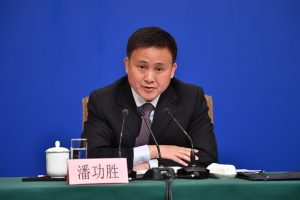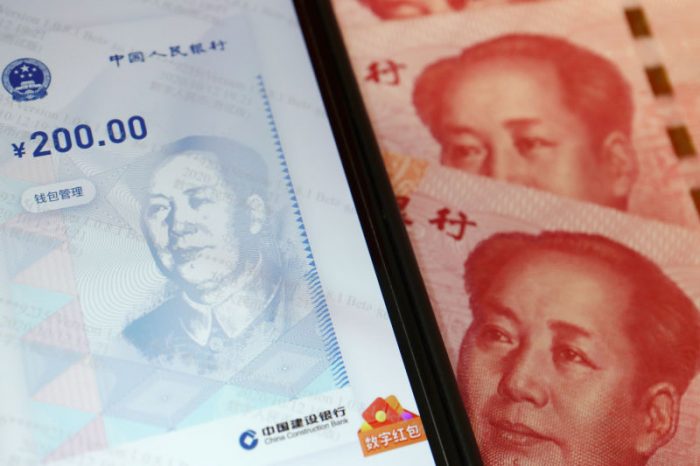China’s central bank is ramping up its push for a multi-polar currency system for the world.
Pan Gongsheng, governor of the People’s Bank of China (PBOC), vowed to expand international use of the digital yuan and is angling for a system in which several currencies dominate the world economy.
China will establish an international operation centre for digital yuan – or e-CNY – in Shanghai, Pan said on Wednesday at the Lujiazui Forum, a high-profile gathering of local and foreign financial industry executives and regulators.
ALSO SEE: China AI Firm Used SE Asia Data Centre to Beat Chip Curbs – WSJ
The remarks come in the wake of renewed appetite for a global yuan, as international trade tensions sparked by US tariff policies prompt investors to seek alternatives to dollar-based investments.
At the same time, China is accelerating efforts to develop financial systems independent of Western institutions, moves that have gained fresh impetus as shifting trade patterns and geopolitical realignments reshape the global economic landscape.

“Developing a multi-polar international monetary system will help strengthen policy constraints on sovereign currency countries, enhance the resilience of the system, and better safeguard global financial stability,” Pan said.
Such a system would pave the way for some currencies to hold sway in their respective regions, lessening reliance on the dollar.
Pan expects several key global currencies to coexist in mutual competition with checks and balances in place.
Chaotic tariffs rollout erodes dollar’s appeal
Washington’s aggressive and chaotic rollout of tariffs has shaken faith in the US currency and other US assets, prompting a broader shift by investors away from the US dollar and towards Asian currencies and the euro.
The eroding US dollar appeal also comes amid rising global interest in cryptocurrencies, including stablecoins – a type of virtual currency that is backed by an asset and holds a stable price.
China has long harboured ambitions for the yuan to be a global currency, similar to the euro or dollar and reflective of the importance of the world’s second-biggest economy.
But that goal has been hampered by unwillingness to open the capital account, and while there’s no sign of that changing, progress on other fronts, where it has gained in places such as Russia and other trading partners, stands to accelerate.
More banks using CIPS
On Wednesday, six foreign banks including Standard Bank and First Abu Dhabi Bank agreed to use China’s Cross-Border Interbank Payment System (CIPS), the yuan-based international settlement system in the future, state broadcaster CCTV reported, a step that further expands the use of yuan in global trade.
Pan said that digital technologies have exposed weakness in traditional cross-border payment systems, which are less efficient, and vulnerable to geopolitical risks.
“Traditional cross-border payment infrastructures can be easily politicised and weaponised, and used as a tool for unilateral sanctions, damaging global economic and financial order,” Pan said.
Speaking at the forum, China’s foreign exchange regulator vowed to keep the yuan exchange rate basically stable and fend off external shocks and risks.
China’s ability to counter forex market volatility has improved, Zhu Hexin, head of the State Administration of Foreign Exchange, said.
Beijing will also further open up its financial market to foreign players, Li Yunze, director of the National Financial Regulatory Administration, told the forum.
“Foreign institutions are important bridges and links for attracting investment, talent, and are important participants and active contributors to the construction of China’s modern financial system,” Li said.
China will create a transparent, stable and predictable environment for foreign players and will explore options to open up a wider range of financial areas, said Li.
Li added that China’s rapidly growing consumer market would also bring more opportunities for foreign institutions.
- Reuters with additional editing by Jim Pollard
























